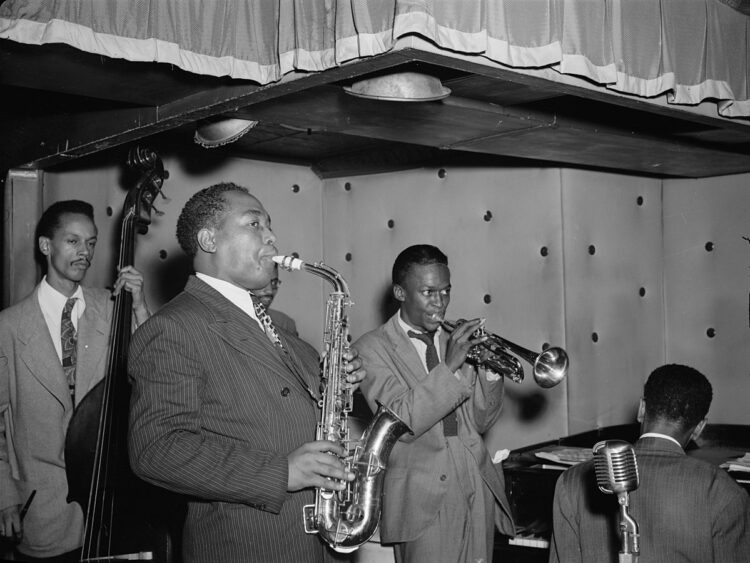|
Getting your Trinity Audio player ready…
|
On August 29, 1920, Charles Parker Jr. was born in a home at 852 Freeman Avenue, Kansas City, Kansas. The name of the street was also fortuitous as he would be the one to free music from its confines to a higher plane of expression. Despite living only a short thirty-four years, Parker established himself as one of history’s greatest musicians. Although improvisation played a significant role in “jazz” before Bird, he took it to the next level by using small parts of compositions to build new harmonic fixtures while exploring the outer ranges of melodicism.
In the process, he inspired countless musicians. As such, it is unsurprising that there are several tributes to him on the centennial anniversary of his birth. Many focus on his compositions. Others will re-narrate his life story. And while each is well-appreciated, in some ways, they also miss the central point of Parker’s legacy. Yes, “Yardbird Suite,” “Anthropology,” and several others continue to fascinate. His biography is worth revisiting. But neither is where his true glory lies. Instead, it is in his expansive ethos, one that sees rules not as hard and fast but barriers to test. As Parker himself said, “[t]hey teach you there’s a boundary line to music. But man, there’s no boundary line to art.”
And so, this list selects less traditional albums dedicated to his artistic greatness. Each overtly honor Bird but, like the saxophonist himself, aren’t intent on replicating what came before but instead pushing into new territory.
Bird Up: The Charlie Parker Remix Project (Savoy Jazz, 2003)
Although the title is a bit of a misnomer as it does not, in any technical sense, remix any of Parker’s recordings, it does adopt the spirit of that approach by taking the originals and introducing new thoughts and context to them. Producer Matthew Backer assembled an impressive team of collaborators from across the musical spectrum to make his reimagined picture a reality. Electronic and acid are writ large but far from the only influences. Consider “Salt Peanuts (The Mr. Peanut Chronicles),” one of the finest tracks, and the brainchild of the late Hal Wilner. It begins with the Kronos Quartet presenting a few bars reminiscent of the great Charlie Parker with Strings (Mercury Records, 1950) before it forges its own path drawing equally from jazz, classical, and folk. Dr. John and Mocean Worker join in along the way, over the backdrop of Dizzy Gillespie’s Quintet. Meshell Ndegeocello’s deep bassline guides her “Relaxin’ At Camarillo (August 29)” duet with Ray Angry’s soulful organ. On “Steeplechase (Sittin’ on 22’s),” Dan the Automator validly contends that any perceived line between “jazz” and “hip hop” is arbitrary; one could even argue that Parker’s approach to improvisation of placing together different shards of phrases was an antecedent to sampling. It is a concept the Rob Swift produced “Cheers (X-Ecutioners Style)” pushes even further by adding loops of spoken voice, record scratches, and digital beats.
Bird Calls – Rudresh Mahanthappa (Act Music, 2015)
Alto saxophonist Mahanthappa has long been interested in testing the abilities of his horn. On Samdhi (Act Music, 2011) he experimented with hooking its bell up to a laptop to create new effects. Even earlier, he explored the connections between “jazz” and Indian music on Kinsmen (Pi Recordings, 2017), something he has explored in each of his other works as well, including this one. With Bird Calls, he tests the idea of a musical tribute. Although none of Parker’s compositions appear on this recording, in a truer sense, many do. The alto saxophonist often stretched the ideas of others as a method of creating something new. Often this came by way of extending chords, whether turning “How High the Moon” into “Ornithology” or Gerswhin’s “I Got Rhythm” into “Moose the Mooche.” On the same instrument, Mahanthappa, alongside Adam O’Farrill, Matt Mitchell, Francois Moutin, and Rudy Royston – builds off of this idea not by further experimenting with chordal structures but instead penning new ones which invoke those that came before as “Parker’s Mood” forms the opening of “Talin is Thinking” and “Donna Lee” shapes “On the DL.” Throughout, however, the bandleader retains his own sound; it is recognizably a Mahanthappa album even as it honors another artist.
Freebird – Walking Distance Featuring Jason Moran (Sunnyside Records, 2018)
In their sophomore release, saxophonists Caleb Curtis and Kenny Pexton, bassist Adam Coté and drummer Shawn Baltazor are joined by a modern piano master. Moran’s inclusion is inspired as he has in recent years found ways to breathe new life into older compositions with his Fats Waller Dance Party. And while Freebird does not aspire to the R&B and pop aesthetic of that project, it too seeks to transform older pieces through deconstruction and reassembly. Neither the more upbeat “Ghilnooorty Classic” nor torturously slow and dark “Simple Ghilnooorty” are explicitly built off of “Ornithology” yet one senses the piece’s ghost haunting them as if lurking between the horn’s phrases. Similarly, with “Bigment” neither Moran’s fragmented stride nor the horn blasts directly invoke “Segment” but one senses it hidden somewhere. Overall, it is an interesting album that suggests sometimes a great artist’s inspiration can run so deep that often it is still there even when not exactly obvious.
Sextet (Parker) 1993 – Anthony Braxton (New Braxton House, 2018)
This album builds off of the fantastic Charlie Parker Project 1993 (HatArt 1995) and expands it to a complete 11 CD, 58 track set. Just as the trio Thumbscrew recently performed his own compositions in their personal style, one of the greatest modern musical minds honored his predecessor without sacrificing his identity. To do so, Braxton surrounded himself with an impressive group of creative music masters – saxophonist Ari Brown, trumpeter Paul Smoker, pianist Misha Mengelberg, bassist Joe Fonda, and Pheeroan akLaff and Han Bennink switching off on drums. A combination of live and studio performances finds the ensemble exploring the edges of songs like “Ko Ko,” and Gillespie’s “Night in Tunisia” among others. For the most part, the heads of the tunes remain deceptively similar to the originals. The solos, certainly, do not. They are further out than anything even Parker imagined. The instrumentation is also at times atypical, with one finding the leader presenting “Sippin’ At Bells” and “Scrapple From the Apple” on contrabass clarinet. A few times, he even trades in the keys of a horn for those of a piano. One wonders if perhaps Parker himself would have explored these concepts, had he not experienced such a short and tragic life.
Charlie Parker with Strings – The Bleat (Self-produced, 2018)
Although adopting its name from one of Bird’s most famous albums, it sounds nothing like it. Nor do any of the songs match. A sequentially numbered series of nine parts supplants standards like “Dancing in the Dark,” or “I Didn’t Know What Time It Was.” Very little information is available on the release or its recording session, adding an air of mystery. But it appears the group of Nick Fraser, Justin Haynes, Phil Melanson, and Jeff LaRochelle. In speaking to Fraser, he was able to confirm the concept was to showcase the tunes and tempos from Parker’s version. In essence, it borrows the shells of these pieces and fills them with experimental concepts including the use of two snare drums recorded outside. A zig-zagging clarinet, a haunting piano, and an ethereal guitar. At times one almost hears fragments of the original but like a wave to shore, they come quickly then just as rapidly, pull away.
The foregoing list examined only five of the countless works in which Parker’s legacy continues to thrive. Upon Charlie Parker’s death in 1955, Ted Joans, a lesser-known beat poet, began a campaign of writing in chalk on sidewalks, walls, and roads. Sixty-five years later, his message remains as accurate and as powerful as it was then: BIRD LIVES.







Leave a Reply